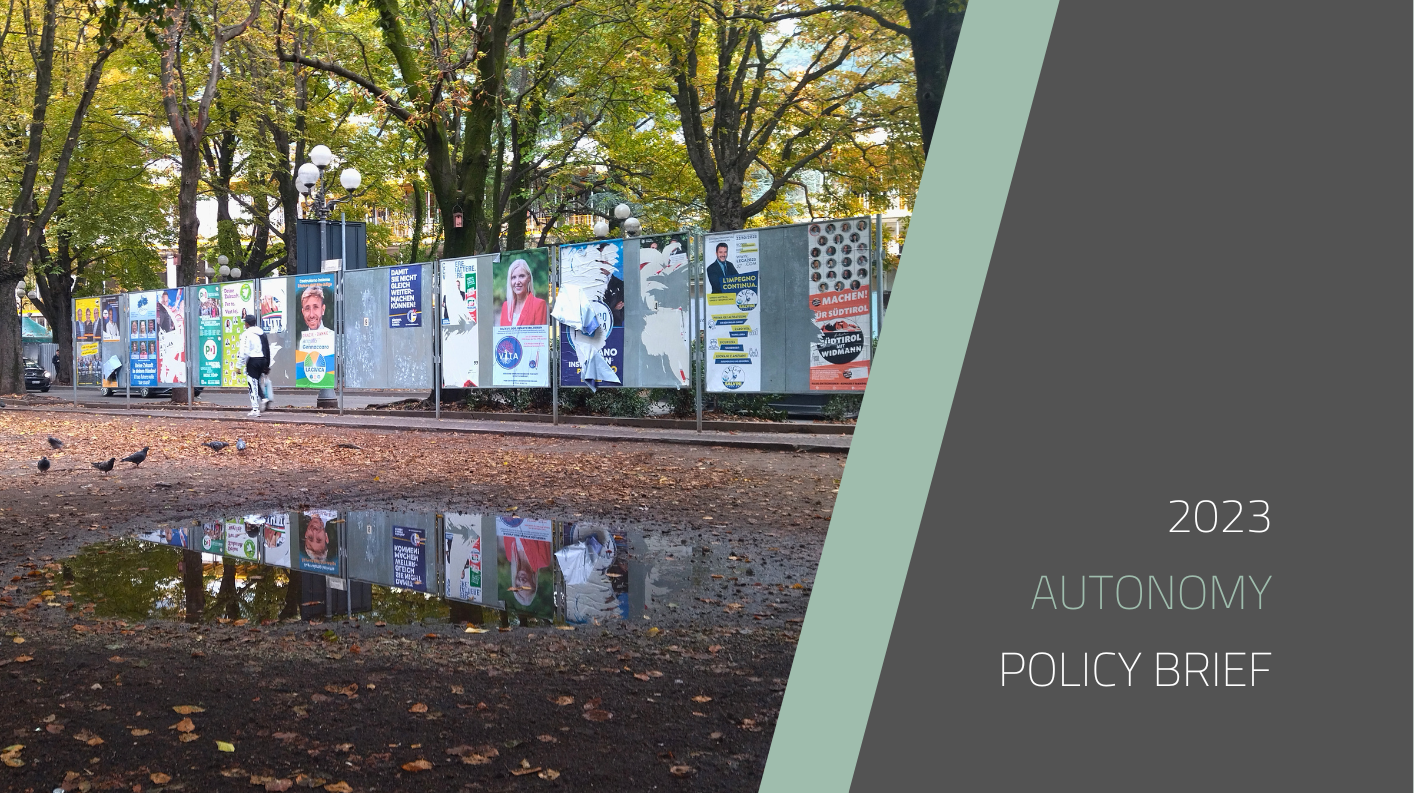Published 13 December 2023
Marc Röggla, Jakob Volgger
The policy brief analyses recent autonomy related developments in South Tyrol. The areas of focus covered include the election of the Provincial Council, new enactment decrees, finances, the language group census as well as current school policy debates.
Political developments
Politics in South Tyrol was shaped by the election campaign and the provincial elections in 2023. This year’s provincial election led to a further decline in voter turnout (2023: 71.5%; 2018: 73.9%) and a fragmentation of the party landscape. The South Tyrolean People’s Party (Südtiroler Volkspartei, SVP) – the largest party in the province since 1948 – lost two seats in the Provincial Council, continuing the negative trend of the last decades. In addition to an Italian partner, another German party is required for the first time to form the government. The number of members of the Italian language group fell by three seats in the Provincial Council. Thus, the Italian language group is underrepresented according to the 2011 language group census (5 seats out of 35). The Ladin language group is represented with one representative less in the Provincial Council (1 out of 35 seats).
Table 1: Comparison of results of the 2018 and 2023 provincial elections (source: civis.bz.it)
| 2018 | 2023 | |||
| Parties | % | Seats | % | Seats |
| Südtiroler Volkspartei | 41.9 | 15 | 34.5 | 13 |
| Team K | 15.2 | 6 | 11.1 | 4 |
| Süd-Tiroler Freiheit | 6 | 2 | 10.9 | 4 |
| Verdi Grüne Vërc | 6.8 | 3 | 9 | 3 |
| Fratelli d’Italia | 1.7 | 1 | 6 | 2 |
| JWA – Wirth Anderlan | – | – | 5.9 | 2 |
| Die Freiheitlichen | 6.2 | 2 | 4.9 | 2 |
| PD Partito Democratico – Demokratische Partei | 3.8 | 1 | 3.5 | 1 |
| Für Südtirol mit Widmann | – | – | 3.4 | 1 |
| Lega Salvini Alto Adige Südtirol – Uniti per l’Alto Adige | 11.1 | 4 | 3 | 1 |
| La Civica | – | – | 2.6 | 1 |
| Vita | – | – | 2.6 | 1 |
| Movimento 5 Stelle | 2.4 | 1 | 0.7 | 0 |
| Enzian | – | – | 0.7 | 0 |
| Forza Italia | 1 | 0 | 0.6 | 0 |
| Centro Destra | – | – | 0.6 | 0 |
According to the Autonomy Statute, the Provincial Government must reflect the proportion of the language groups in the Provincial Council. However, shortly after the election, it was disputed how many seats the Italian language group would have under a possible eleven-member Provincial Government. In November, the Provincial Council issued a legal opinion confirming that, in the event of the SVP’s intention to appoint a Ladin to the government, only one Italian member of the government is anticipated. However, this assertion is contradicted by the legal opinion of the Avvocatura dello Stato (Attorney General). In the aforementioned scenario, the latter posits that there would be two Italian members in the government. The decision on whether there will be an eleven-member Provincial Government is a matter under discussion in coalition talks.
In early December, the SVP announced its intention to engage in negotiations with Fratelli d’Italia, Lega, La Civica, and Die Freiheitlichen. The SVP’s strategy appears to be geared towards facilitating autonomy negotiations with the Italian government by involving Fratelli d’Italia in South Tyrol’s government. The ongoing negotiations aim to reinstate legislative powers that have been restricted in the past, with this loss attributed, among other factors, to the Italian constitutional reform of 2001 and decisions made by the Constitutional Court.
Nationally, there is a shared aspiration among all autonomous regions and provinces to reclaim their autonomous competences. To this end, a proposal for a constitutional amendment was jointly presented to Italian Prime Minister Giorgia Meloni.
Legal developments
With the Italian parliamentary elections in 2022, it became necessary to reappoint the state representatives of the Commission of 6 and 12. In February, the Italian Government, comprising Fratelli d’Italia, Lega, and Forza Italia, appointed Eleonora Maines, Alessandro Urzí, and Anton von Walther as members of the Commission of 6. South Tyrol is currently represented by Meinhard Durnwalder, Manfred Schullian, and Carlo Vettori. Due to the 2023 provincial elections, the representatives of South Tyrol will need to be reappointed.
In 2023 five enactment decrees have been adopted. From the perspective of minority protection, Legislative Decree No. 65 of 15 May 2023, is particularly relevant. In the future, applicants for public posts must take at least one of the written examinations, if applicable, and, in any case, the oral examinations in the language of the language group to which they belong or have affiliated themselves. Previously, the language for exams could be freely chosen and did not have to correspond to one’s own language group declaration. This new rule does not apply to those who belong to the Ladin language groups.
Regarding sport autonomy, an enactment decree was adopted in September. On one hand, the decree specifies that the National Olympic Committee (CONI) will be located in the two autonomous provinces at the provincial level, no longer at the regional level. CONI, national sports federations, affiliated sports disciplines, and organizations promoting sport must also consider the linguistic characteristics of South Tyrol. Additionally, the enactment decree recognizes the Verband der Sportvereine Südtirols and the Unione delle Società Sportive Altoatesine as institutions for the promotion of sport. This is an exception as, typically, associations are recognized as bodies for the promotion of sport only if they operate in at least five regions.
Table 2: Implementing provision adopted in 2023 (source: LexBrowser)
| Enactment decree | Subject area |
| Legislative Decree of 15 May 2023, No 64 | Legal assistance by the Avvocatura dello Stato (Attorney General) |
| Legislative Decree of 15 May 2023, No 65 | Quota system in the state offices in the Province of Bozen/Bolzano and the knowledge of the two languages in the public service |
| Legislative Decree of 31 July 2023, No 113 | Audits by the Court of Auditors |
| Legislative Decree of 26 September 2023, No 143 | Spatial planning and landscape protection |
| Legislative Decree of 26 September 2023, No 1471 | Sports and leisure activities with the corresponding facilities and services |
Social developments
The language group census officially began on 4 December 2023. In this way, the strength of the German, Italian and Ladin language groups in South Tyrol is determined. The language group size is relevant for many issues, for example the posts in the public administration are allocated to the three language groups and public funds are allocated in certain areas (such as culture). All those who held Italian citizenship on 30 September 2023 and who were resident in South Tyrol can participate in the language group census. These criteria apply to around 484,000 people in South Tyrol. For the first time, the language group census takes place online. The results are expected at the end of next year. The last census took place in 2011.
Figure 1: Results of the language group censuses since 1971 (source: ASTAT)

This year, there were also discussions in the education sector. According to school leaders in Bozen/Bolzano, German-speaking children and young people are sometimes outnumbered in German schools. Assessment tests or a multilingual school model were proposed as solutions. However, neither of these proposals found cross-party consensus for the time being.
The fact that an international class programme will be offered in South Tyrol for the first time next year shows that there is constant change in the school sector: At the Realgymnasium Bozen/Bolzano, English is the language of instruction for the programme with a focus on applied natural sciences. German and Italian are also taught. The introduction of this international class was approved by the Procincial Council in 2022.
Fiscal developments
Concerning financial autonomy, it is noteworthy to mention the agreement signed with the State on 25 September 2023. This agreement ensured two significant developments for South Tyrol. Firstly, the province was guaranteed a payment of approximately 268 million euros to compensate for revenue shortfalls between 2010 and 2020. Secondly, the annual contribution to state finances was reduced from the previous 713 million euros to 688 million euros starting from the year 2023. Under the terms of the new agreement, the Autonomous Provinces of Bozen/Bolzano and Trento have relinquished the tax on heating oil. This decision comes as excise payments have seen a decline in recent times due to reduced usage of oil for heating.

